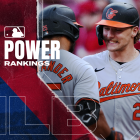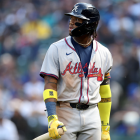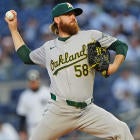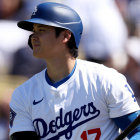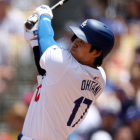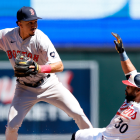Justin Verlander will have to save the Astros' season on Friday, as he will square off against the Yankees' Luis Severino in a Game 6 that is win or go home for Houston.
Verlander has had a stellar postseason to this point, going 3-0 (with a bullpen appearance accounting for one of those wins) and giving up at total of four earned runs. He has a WHIP of just 0.96. In his first appearance against the Yankees, Verlander threw a complete game that the Astros ended up winning in walkoff fashion.
For Severino, it's been a slightly different experience. He's given up seven runs in three starts (including an outing in the Wild Card Game in which he recorded only one out) and his WHIP stands at 1.24. He's normalized his statline since that horrific start -- in fact, outlier game aside his WHIP is a mere 0.81 -- but his inexperience has shown in the postseason.
There will be no easy outs for either team tonight. The combination of a young team looking to advance and a team fighting for its life never produces easy pitching matchups, but Verlander and Severino are up to the task.
Here's a look at how both teams have fared against each pitcher in their respective careers.
Yankees vs. Verlander
| Batter | PA | H | AVG | BB | HR |
|---|---|---|---|---|---|
| Brett Gardner | 42 | 10 | .270 | 3 | 1 |
| Aaron Judge | 4 | 0 | .000 | 0 | 0 |
| Gary Sanchez | 4 | 0 | .000 | 0 | 0 |
| Didi Gregorius | 13 | 3 | .300 | 2 | 1 |
| Aaron Hicks | 12 | 1 | .083 | 0 | 0 |
| Greg Bird | 4 | 0 | .000 | 1 | 0 |
| Todd Frazier | 18 | 4 | .222 | 0 | 1 |
| Chase Headley | 18 | 6 | .333 | 0 | 1 |
| Starlin Castro | 9 | 1 | .111 | 0 | 0 |
The key will be Aaron Judge continuing his monstrous ALCS. Judge will have to break out of his slump against Verlander, as he's become a jumper cable of sorts for the Yankees lineup. Veterans like Brett Gardner have some success against Verlander, while Didi Gregorius and Chase Headley have both have moderate success in limited at-bats.
Obviously some of these players may not even be hitting against Verlander, as the lineups haven't been released yet. Jacoby Ellsbury is an option for the Yankees, he's seen Verlander before, but his recent struggles may not make him the best choice. The thing that also makes Verlander different is that he doesn't tailor his pitching style to the postseason, outside of one key change which will become apparent later.
Astros vs. Severino
| Batter | PAs | H | AVG | BB | HR |
|---|---|---|---|---|---|
| Jose Altuve | 3 | 1 | .333 | 0 | 0 |
| Carlos Correa | 3 | 1 | 1.000 | 1 | 1 |
| George Springer | 3 | 0 | .000 | 0 | 0 |
| Josh Reddick | 6 | 1 | .167 | 1 | 0 |
| Alex Bregman | 1 | 0 | .000 | 0 | 0 |
| Carlos Beltran | 1 | 0 | .000 | 0 | 0 |
| Marwin Gonzalez | 3 | 0 | .000 | 1 | 0 |
| Brian McCann | 1 | 0 | .000 | 0 | 0 |
| Yuli Gurriel | 2 | 0 | .000 | 1 | 0 |
The Astros didn't hit Severino particularly well in Game 2 when they first met, netting only two hits through four innings, but it fit the modus operandi of manager Joe Girardi to quick-hook Severino in a duel against Verlander. Verlander ultimately came out on top, but the Yankees bullpen kept it close.
For the Astros, they've lived and died by the long ball -- a viable strategy when your pitching is throwing one-run complete games. But it's gotten them in trouble in recent games, and they'll need to drive Verlander's pitch count up early and often if they're to have a chance against him. The Astros lineup isn't particularly impressive against Severino, but it does have pop, and it can break out at any time.
Pitch selection has also become a big part of these pitchers' gameplan, particularly Verlander. Verlander's pitch selection in the regular vs. postseason has been largely the same outside of one key difference.
Verlander pitch selection
| Regular vs. Postseason | Fastball | Changeup | Curve | Slider |
|---|---|---|---|---|
Regular | 57.81% | 3.92% | 16.20% | 21.50% |
Postseason | 57.26% | 1.61% | 9.68% | 31.45% |
The reliance on the slider is the most noticeable change in Verlander's pitch selection. Verlander also had a cutter and a sinker that he threw less than 1 percent of the time early in the season, pitches that he completely eschewed upon his arrival to Houston. Since entering the postseason, Verlander has preferred the hard action of the slider to the 12-6 curveball.
Those numbers may change against the Yankees tonight, however, and we could see a steady diet of curveballs to the middle of the Yankee order -- specifically to Aaron Judge, who has struggled with the pitch this postseason so far. With the tear that he's on, the Astros would do well to pitch Judge differently in Game 6.
Severino pitch selection
| Regular vs. Postseason | Fastball | Changeup | Slider |
|---|---|---|---|
Regular | 51.70% | 13.27% | 35.03% |
Postseason | 60% | 8% | 32% |
What makes Severino interesting is that his season follows a sort of bell curve from being a two-pitch pitcher that only throws his change once a blue moon to someone hovering around 20 percent changeups in the month of July. He has a changeup, but it's very clear that it isn't his favorite in his repertoire -- and it's become more apparent in the postseason.
This might actually explain why Girardi has called games for Severino the way he has -- and given him so little rope in all three of his starts except for Game 4 of the ALDS, in which he went seven innings. The two-pitch pitching style isn't always sustainable, but the Yankees jumped all over Trevor Bauer in that game so Girardi saw an opportunity to keep Severino in for longer than he was comfortable to save his bullpen. Severino throwing a gem of a game was the icing on the cake.
Basically, Girardi is using Severino as a bullpen pitcher that happens to pitch in the first inning. He goes out, throws fastball-slider for four innings and gets replaced by a bullpen pitcher with a different style. Tommy Kahnle replaces the slider with a sinker, but he's more of a fastball-changeup pitcher, while David Robertson's curve and cutter are his bread and butter pitchers. The Yankees have a bullpen full of niche pitchers that, over the course of a game, create one full pitcher with a full arsenal.
This highlights the key difference between Verlander and the Yankees staff. Where Verlander has four pitches he's extremely comfortable with, the Yankees don't. Verlander can go through the order three times and show batters something different every time. The Yankees can do the same -- but as a unit. That's where Severino shines. He gets through the order once or twice with hard breaking balls, and then Robertson's pitching looks like beer league lobs to keep hitters off-balance. It's an extremely effective mode of pitching, and it's the pinnacle of what people are now calling "bullpenning," which is a bit of a misnomer. Girardi is utilizing his bullpen as a starter, a rather unique (albeit not new) tactic.
The Astros' bats have fallen silent in recent games, but they still have breakout potential. If Severino goes four or five innings, that's a win for the Yankees. A.J. Hinch doesn't need this type of gamesmanship with Verlander -- he knows that Verlander can get anyone out at any time -- and he'll ride it out for as long as he has to with his horse. This is why the Astros brought Verlander on.
Edge: Astros
I like Verlander to force a Game 7. He's 3-0 so far this postseason, and he isn't slowing down. The Yankees' mode is effective, there's no question, but there's no replacement for a pitcher like Verlander. A guy that you can toss out and not have to worry about for six innings is invaluable, and Verlander won't take himself out of any games. All it takes is for a pitcher like Severino to get touched up once or twice before Verlander is in the driver's seat. The Astros' reliance on the long-ball has been an issue for them this postseason, but they can get away with that mentality with Verlander on the mound.














